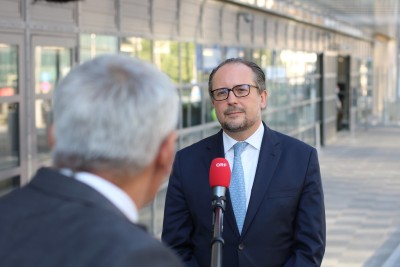Italy and Austria Celebrate 30 Years of Dispute Settlement on South Tyrol
On the occasion of the 30th anniversary of the Dispute Settlement Declaration on South Tyrol between Austria and Italy, Austria's Foreign Minister visited Bolzano. There he met Italy's Foreign Minister Luigi Di Maio to talk with him about the importance of joint cooperation and to celebrate the successful agreement, which since its conclusion has been considered a showcase for Europe.
 Austria's Foreign Minister Alexander Schallenberg in South Tyrol. / Picture: © BMEIA / Paier
Austria's Foreign Minister Alexander Schallenberg in South Tyrol. / Picture: © BMEIA / Paier
Celebrations took place in Bolzano on June 11, 2022, on the occasion of the 30th anniversary of the Declaration of Settlement of the Dispute between Austria and Italy.
The day celebrates the declaration handed over in 1992, which officially ended the dispute between the two states before the United Nations over the implementation of the Paris Treaty.
Joining the festivities was Austria's Foreign Minister Alexander Schallenberg, who attended a meeting with Italian Foreign Minister Luigi Di Maio, as well as a ceremony hosted by South Tyrol's Governor Arno Kompatscher.
The anniversary was kicked off by a press conference between the two Foreign Ministers, the Governor of South Tyrol and the United Nations Special Rapporteur on Minority Issues, Fernand de Varennes. The joint media event was intended to underline the special importance of South Tyrol's autonomy for Austria, Italy and the United Nations.
#Austria | Ministro @luigidimaio incontra a Bolzano/Bozen omologo @a_schallenberg
— Farnesina (@ItalyMFA) June 11, 2022
I profondi legami politici, economici, culturali, sociali e storici fra favoriscono cooperazione su temi europei e internazionali: energia, sicurezza alimentare, Ucraina, Balcani occidentali pic.twitter.com/AFTDCj2jni
"The autonomy of South Tyrol, with the guarantee for the rights of the German-speaking minorities, is a European showcase for peaceful coexistence in Europe and worldwide, of which we can all be justly proud," emphasized Foreign Minister Schallenberg.
In the subsequent discussion between the two foreign ministers, both politicians stressed the enormous importance of cooperation and that it was a common duty to continue to safeguard and promote these achievements in South Tyrol. On this occasion, Austria's Foreign Minister Schallenberg referred to the necessary further development of South Tyrol's autonomy.
"We will continue to exercise our protective function in the future and work to ensure that the autonomy statute can continue to develop and flourish. We share responsibility for this," said Foreign Minister Schallenberg.
In view of the global change of times ushered in by the Russian war of aggression on Ukraine, the long road and the means that had ultimately led to the resolution of the dispute in South Tyrol were recalled.
Referral to the United Nations in the 1960s, for example, had proved to be a "tried and tested means". This clearly showed, he said, that it was worthwhile to resolve differences of opinion between neighboring states by the peaceful means provided for in the United Nations Charter.
Background
Today, about 520,000 people with three different mother tongues live together in South Tyrol. 69.4 percent of the population belong to the German language group, 26 percent to the Italian language group, and 4.5 percent to the Ladin language group. In addition to the three traditional language groups, 46,000 foreigners live in the country, 31,000 of whom come from other EU countries.
The special feature of South Tyrol is the coexistence of these three language groups in a relatively small country: this coexistence was not always as smooth as it is today; only a decades-long process of negotiation - at times accompanied by bombs and violence - has established a balance between German-, Italian- and Ladin-speaking South Tyroleans.
A complex and differentiated legal system, rotation of offices, equal representation on committees and the proportional representation of all language groups are the guarantees for the peaceful coexistence of Germans, Italians and Ladins.
The balance and power-sharing between the language groups is based on the participation of all ethnic groups in the political decision-making process, on a high degree of autonomy for each language group especially in cultural and educational policy, on the so-called principle of proportional representation as a basic rule of political representation, on the inclusion of personnel in the civil service and the distribution of certain public resources (e.g. funds for culture or social housing), and on the minority veto as a last resort to defend fundamental interests of one's own language group. The Treaty of Paris, the Italian Constitution, and the Second Statute of Autonomy are the legal foundations of South Tyrol's autonomy.
BMEIA Federal Ministry for Europe Integration and Foreign Affairs



